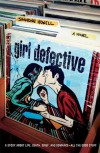Currently reading
Soulless: The Manga Vol. 2 (The Parasol Protectorate Manga #2)
Asymmetry (Twelve Planets)
Mullumbimby Madness #1: Never Trust a Book with a Colour Cover
The Walking Dead, Vol. 18: What Comes After
Sunburnt Country
Bark at the Moon: Bert Rokey's Letters from the South Pacific, 1942-1945: How a Soldier and Sabetha, His Kansas Farm Community, Survived World War II
The Adventures of Tom Sawyer
Girl Defective
Midnight Blue-Light Special
My Policeman
Annexed
 Maybe this book comes across better in text? I listened to the audiobook, and large swathes of it verged on excruciating. The Peter actor chews the scenery all the way through. The impact and authenticity of a good Holocaust novel or memoir, such as Anne Frank's diary, comes from the ordinariness of people's lives in extraordinary, unthinkable surroundings - making friends, falling in love, recording recipes, and making bad jokes as well as contemplating the severity of their situation and the evil of the Nazi regime. Anne speaks of her life in such candid terms, and we feel her changing moods which include joy and fun as well as fear and dread and sadness. In this book, Peter theatrically and relentlessly agonises and laments his way through years of narrative, one hand clutched to his heart and the other to the heavens.Perhaps adopting the spare, factual narrative of most real memoirs may have lent a more genuine feel to this book? Instead, the excessively flowery language and melodrama throughout the novel leaves us fully aware that this is fiction and ultimately robs the novel of any potential for suspension of disbelief or deep emotional effect. This undermining seems much more of a sin in this genre than in others.Were there good things about this novel? Absolutely! I liked the voicing of the non-Peter characters, often very much. Anne and Otto Frank were the stand-out performers. The detailed chronicling of how concentration camps demoralised and dehumanised the victims was both competent and touching. And some of the lyrical language would have been powerfully evocative in a different context, used sparingly.But ultimately, this felt more like pandering miseryfic than like the forceful, haunting novel I was expecting. If you're going to pick it up, I recommend the text version (if it's accessible to you).
Maybe this book comes across better in text? I listened to the audiobook, and large swathes of it verged on excruciating. The Peter actor chews the scenery all the way through. The impact and authenticity of a good Holocaust novel or memoir, such as Anne Frank's diary, comes from the ordinariness of people's lives in extraordinary, unthinkable surroundings - making friends, falling in love, recording recipes, and making bad jokes as well as contemplating the severity of their situation and the evil of the Nazi regime. Anne speaks of her life in such candid terms, and we feel her changing moods which include joy and fun as well as fear and dread and sadness. In this book, Peter theatrically and relentlessly agonises and laments his way through years of narrative, one hand clutched to his heart and the other to the heavens.Perhaps adopting the spare, factual narrative of most real memoirs may have lent a more genuine feel to this book? Instead, the excessively flowery language and melodrama throughout the novel leaves us fully aware that this is fiction and ultimately robs the novel of any potential for suspension of disbelief or deep emotional effect. This undermining seems much more of a sin in this genre than in others.Were there good things about this novel? Absolutely! I liked the voicing of the non-Peter characters, often very much. Anne and Otto Frank were the stand-out performers. The detailed chronicling of how concentration camps demoralised and dehumanised the victims was both competent and touching. And some of the lyrical language would have been powerfully evocative in a different context, used sparingly.But ultimately, this felt more like pandering miseryfic than like the forceful, haunting novel I was expecting. If you're going to pick it up, I recommend the text version (if it's accessible to you).













